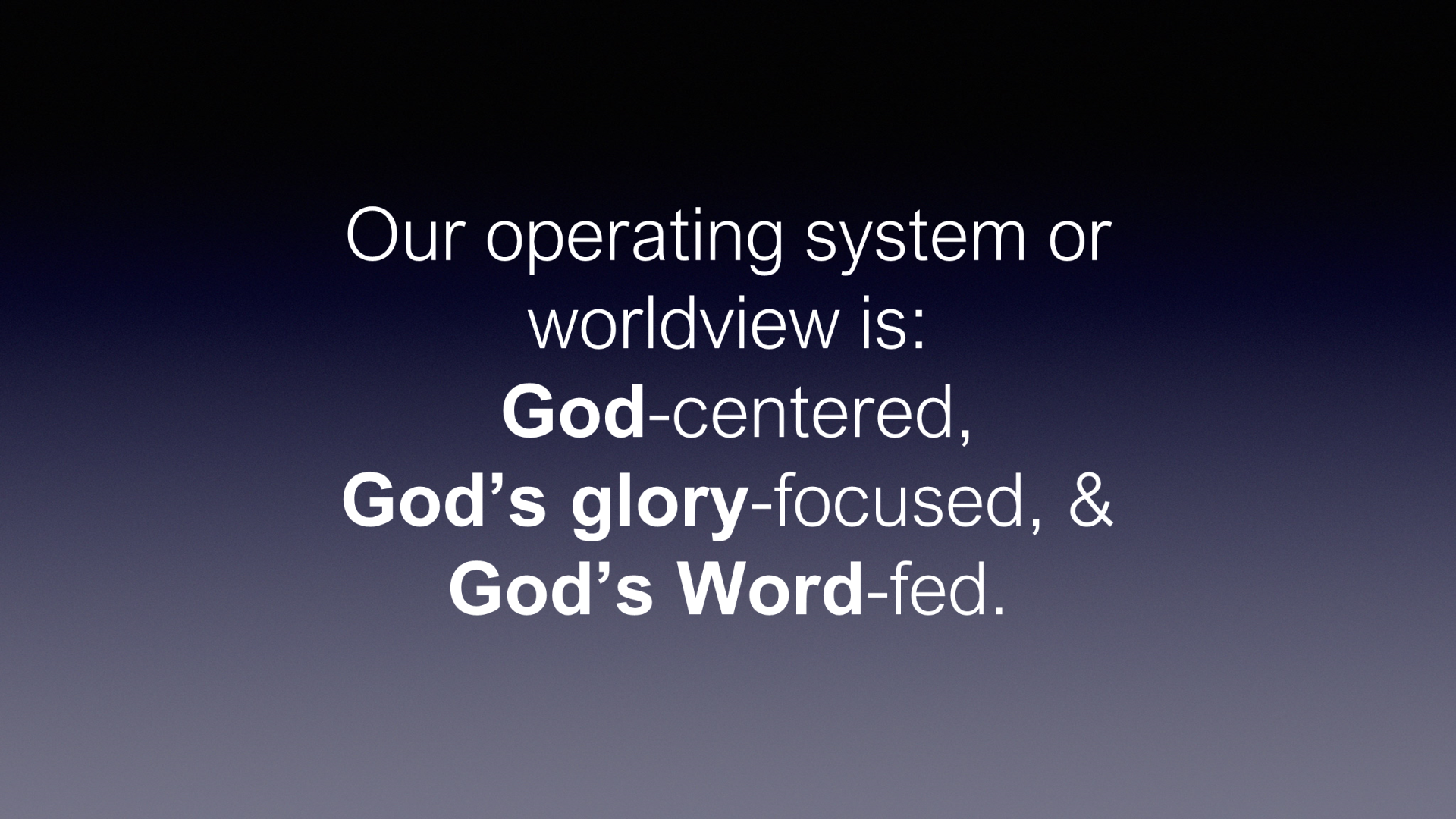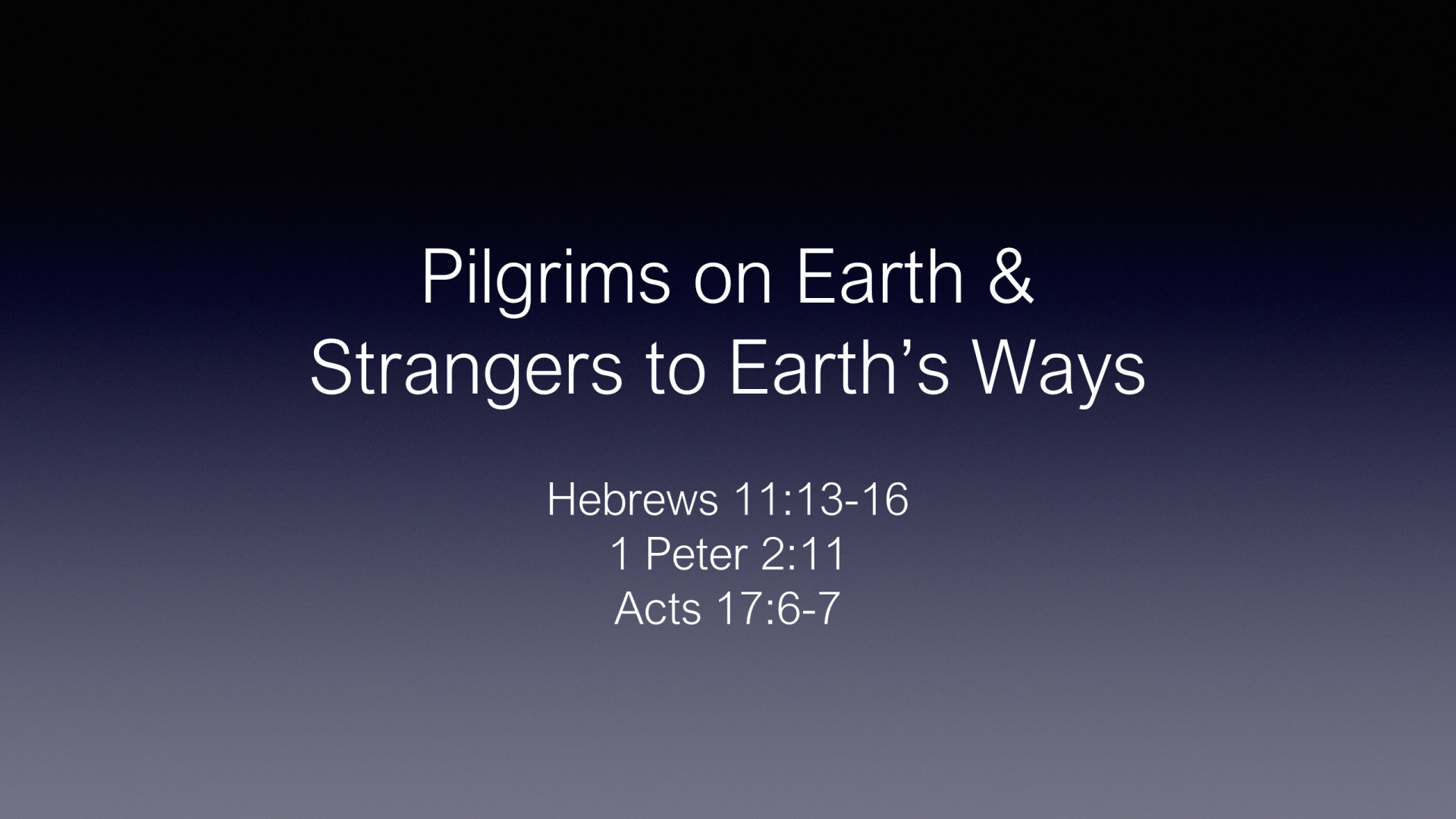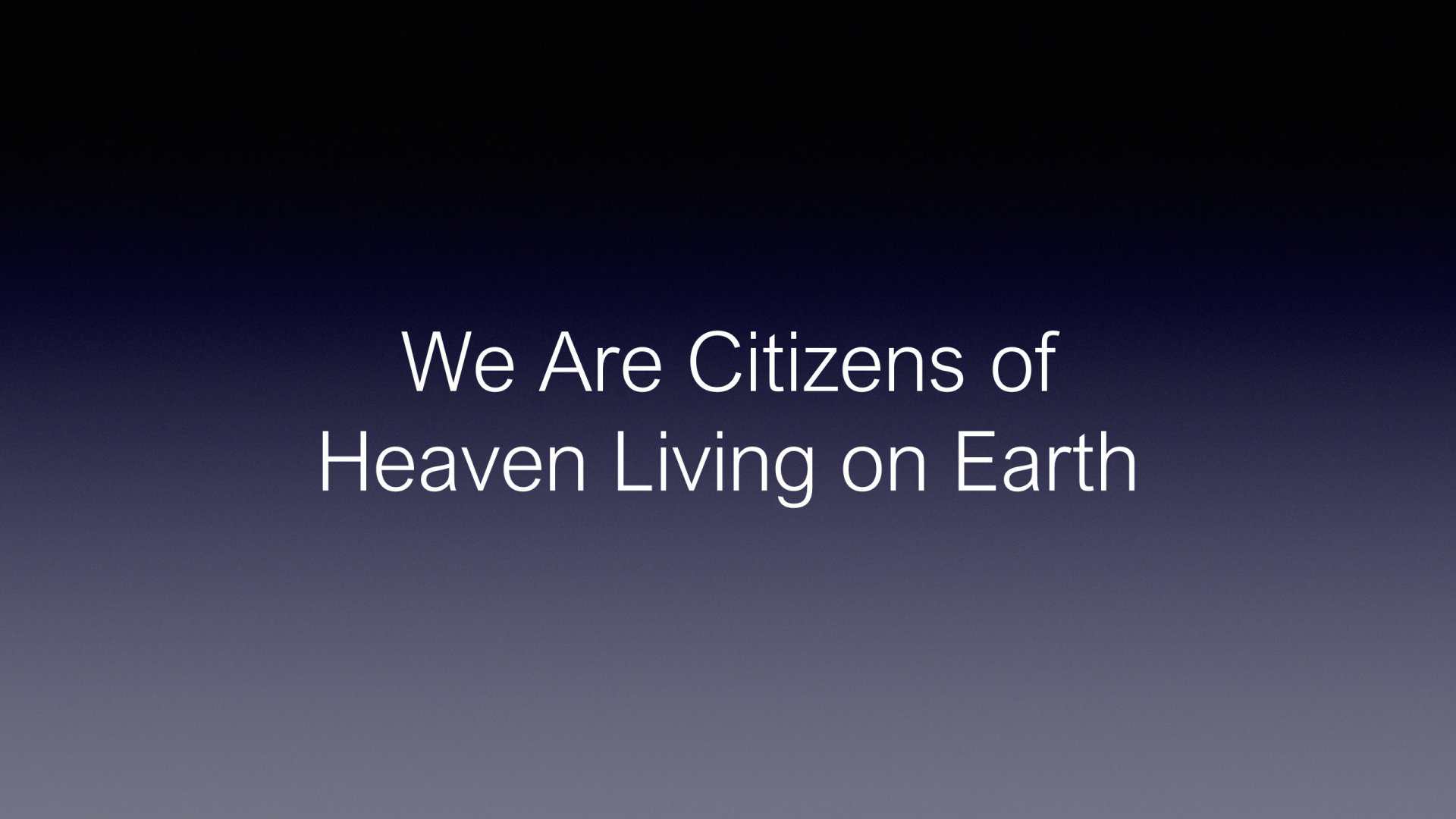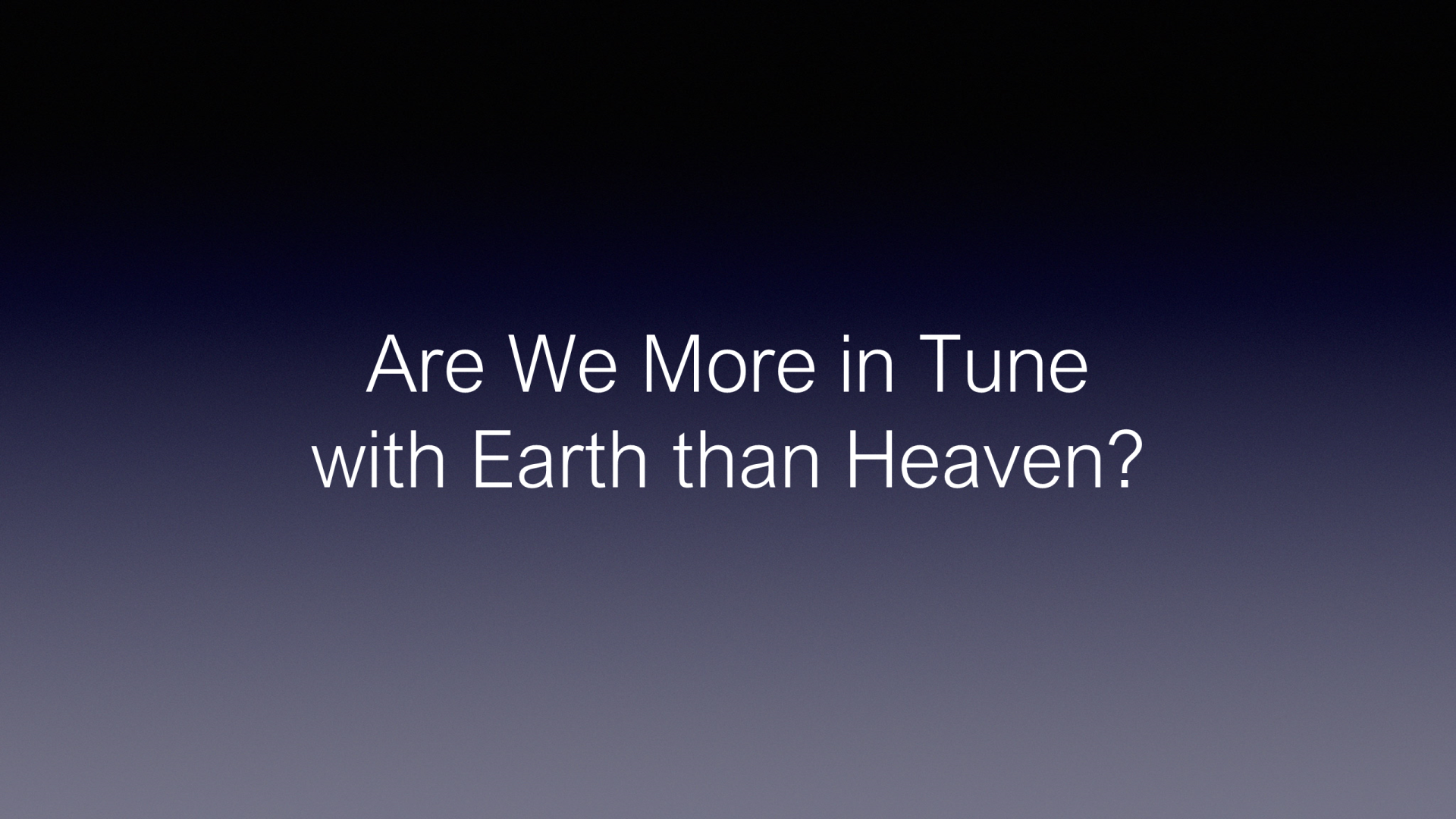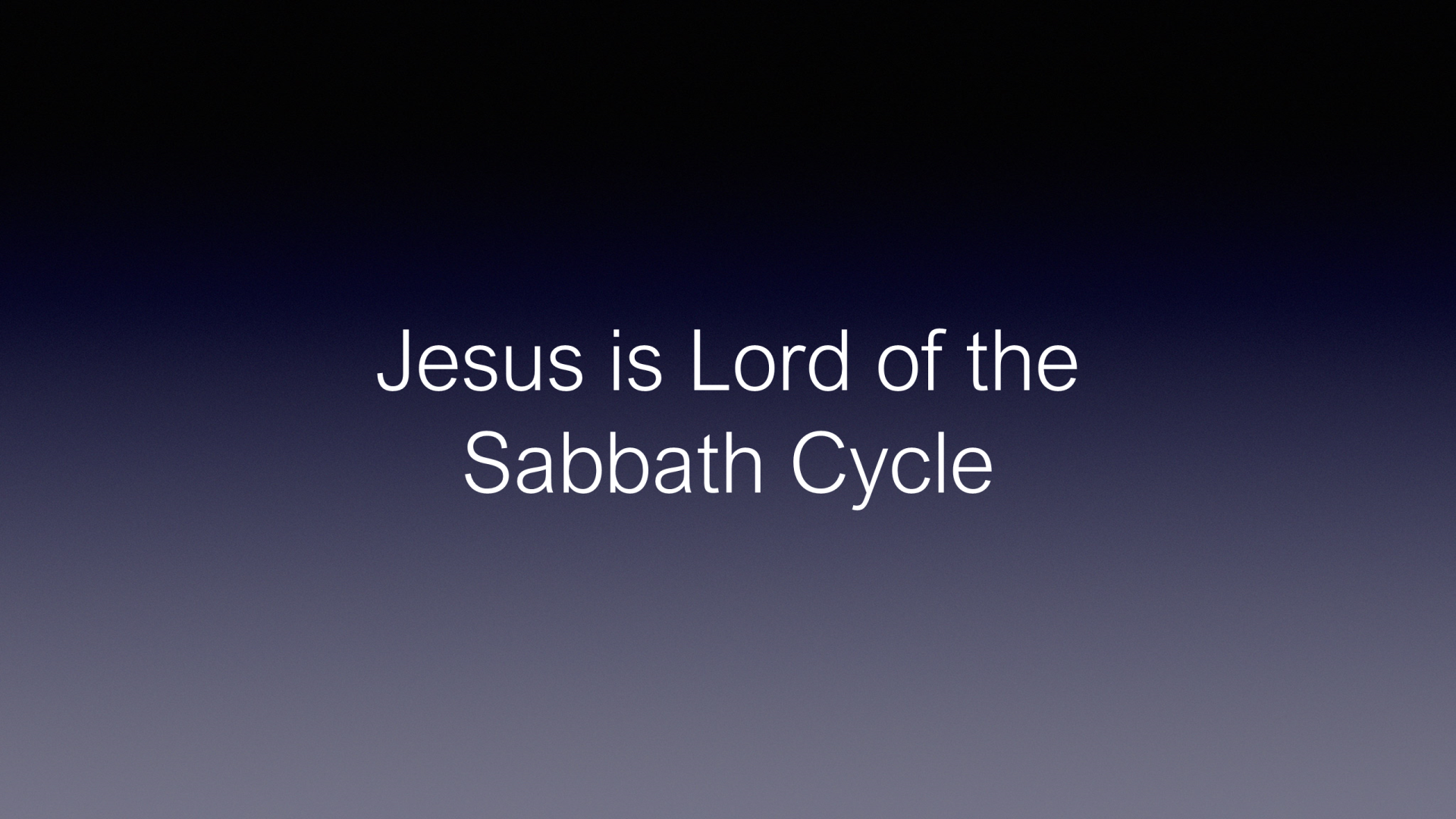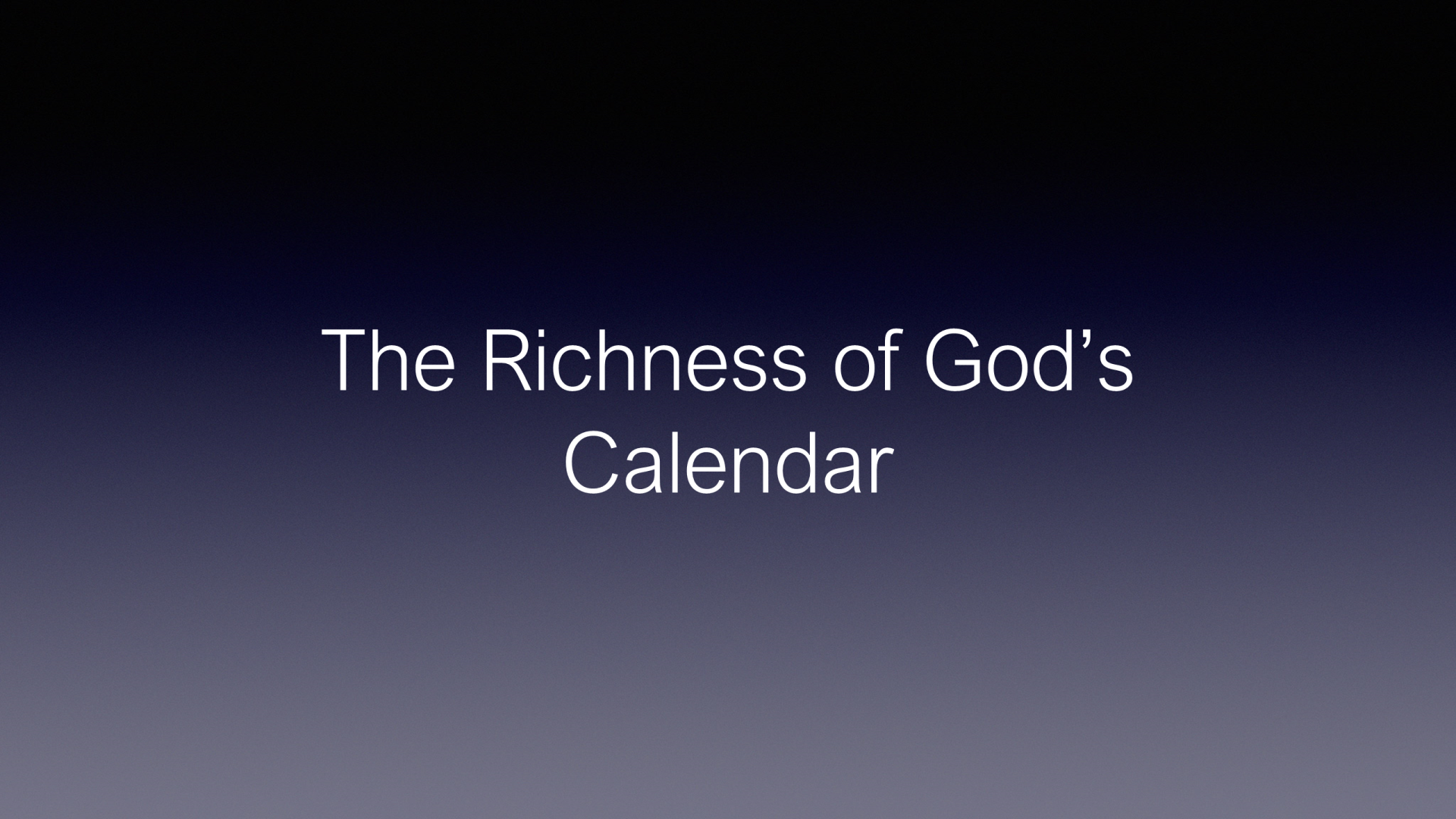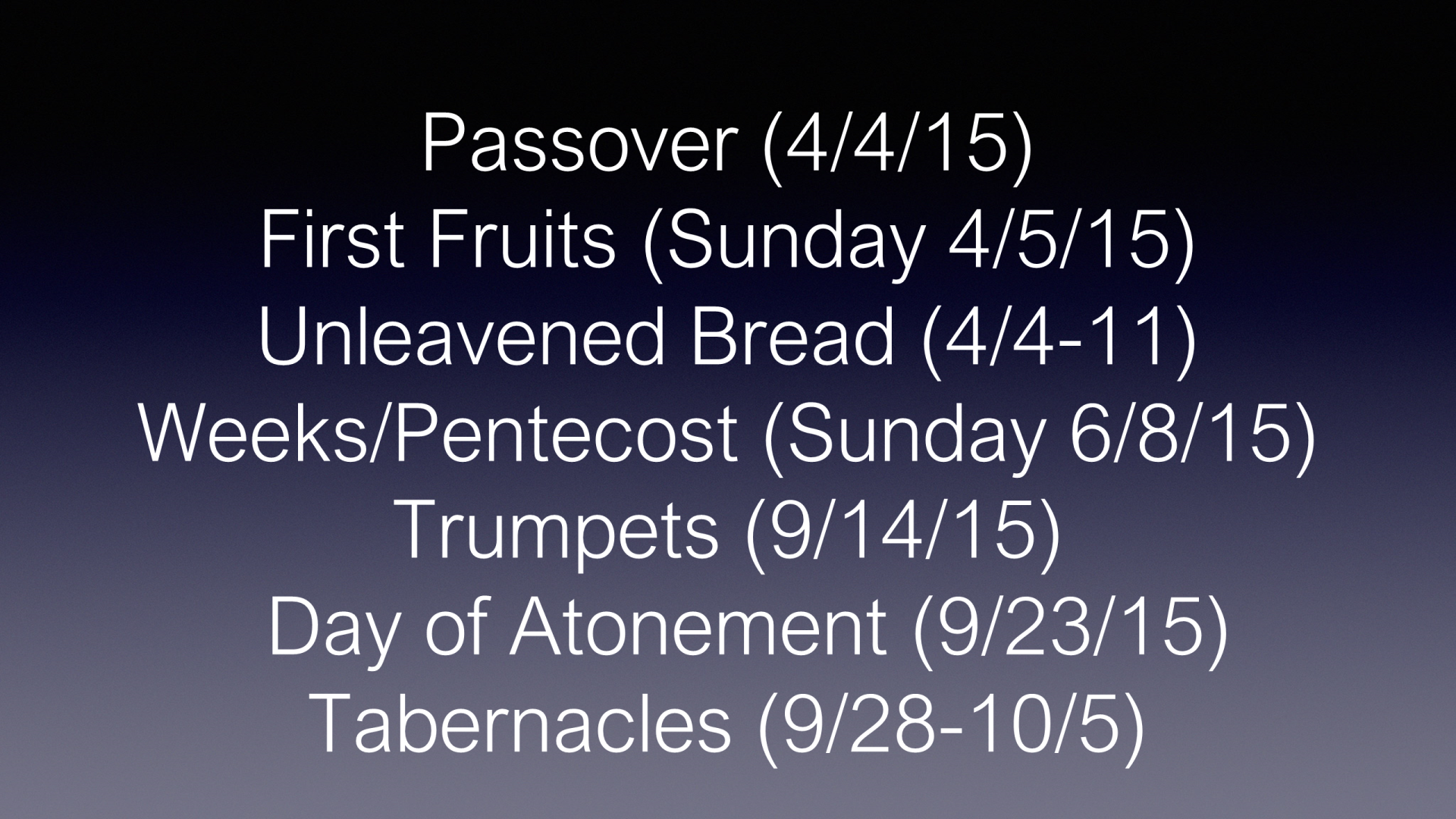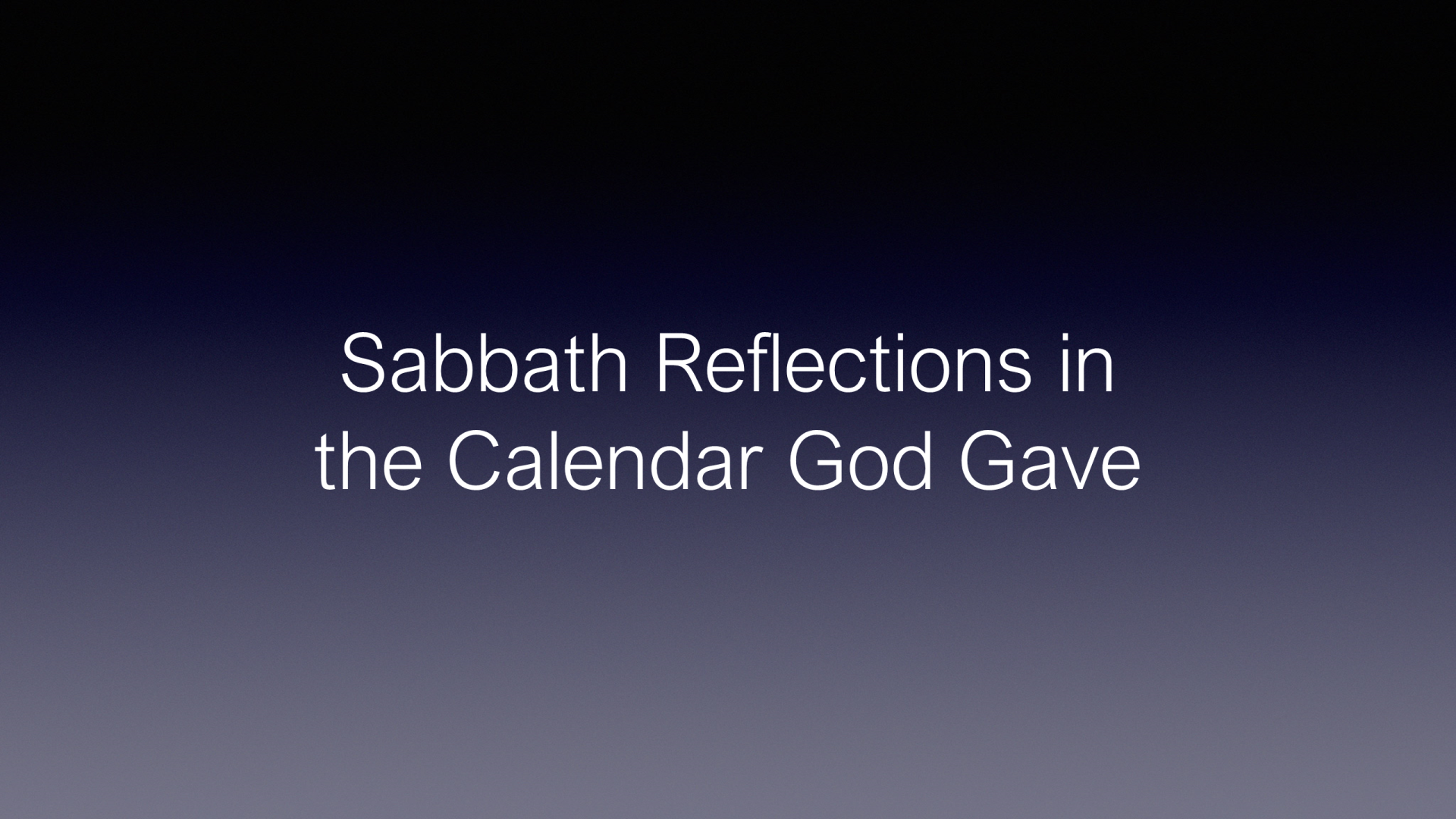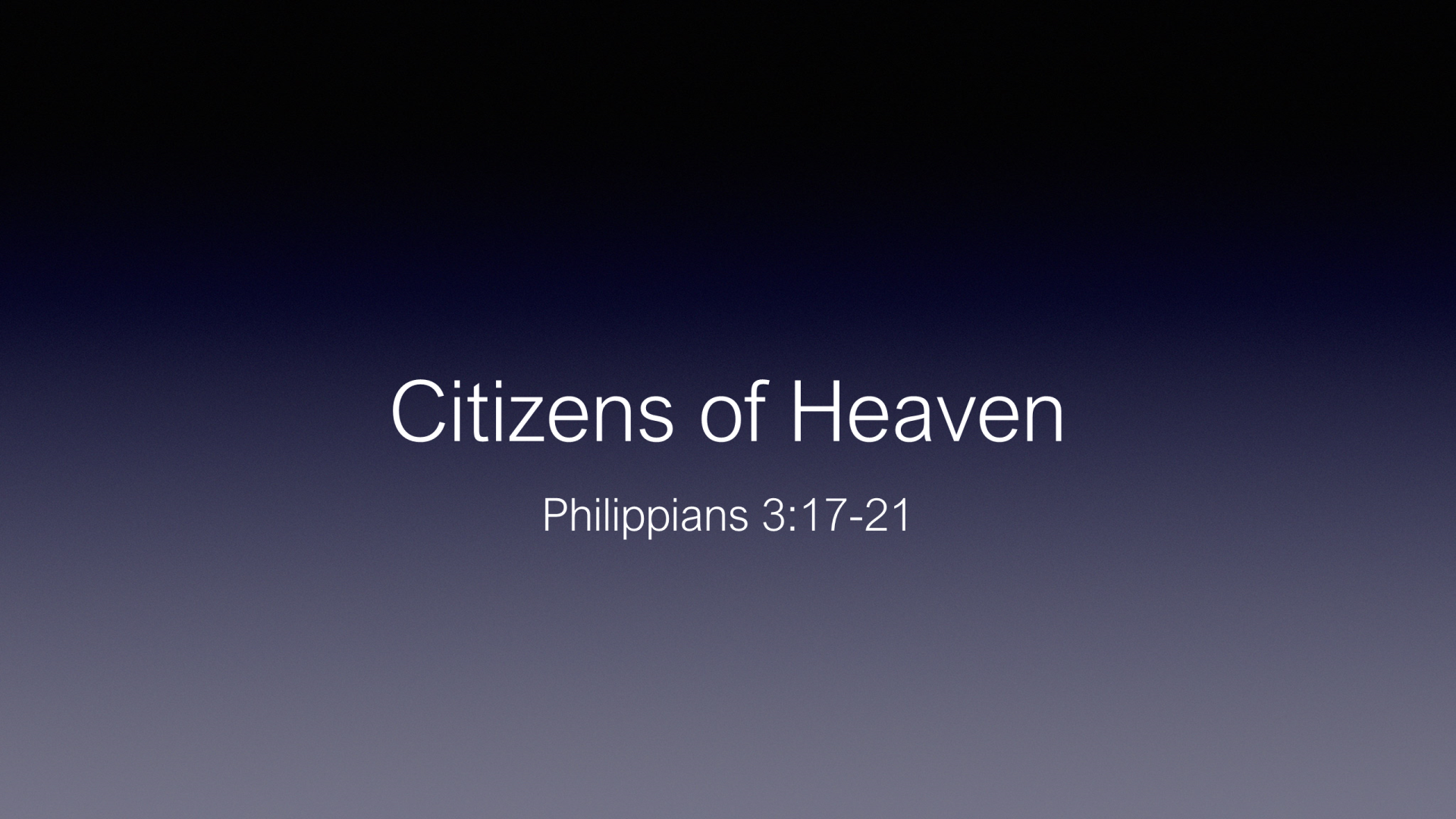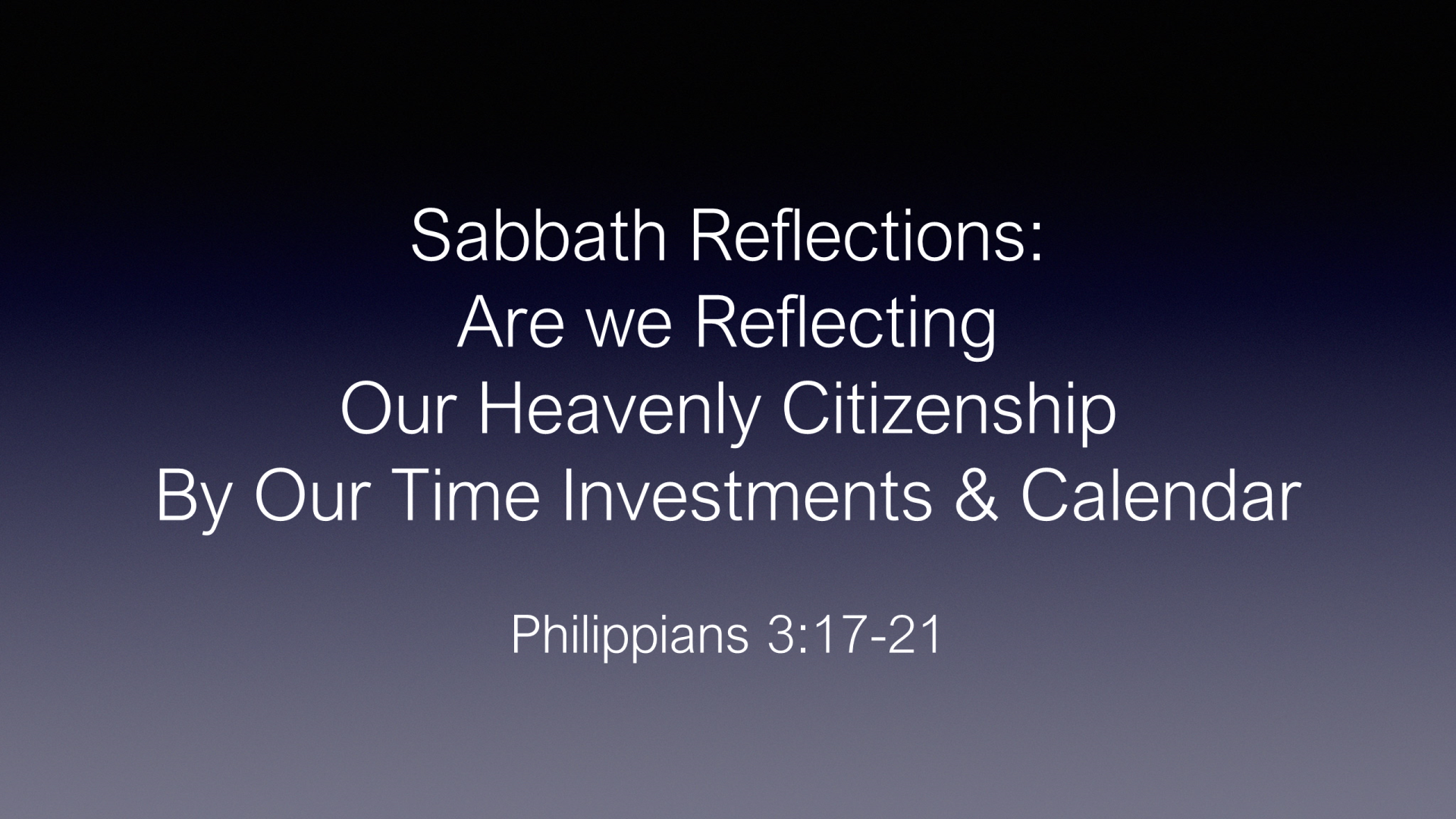If the YouTube video above is not available, here are two other ways to view:
150830AM HFG-14 Holidays.docx
HFG-14
Sabbath Reflections: Are we Reflecting Our Heavenly
Citizenship By Our Time Investments & Calendar
Philippians 3:17-21
As we open to Philippians 3, when Paul sat to write a letter inspied by God to the believers in Philippi, his letter was headed to a Roman colony. Like an island in a vast ocean, Roman colonies were settled with citizens and soldiers that had served well and were given the great benefits of citizenship in colonies of Rome.
Citizens of Rome
A Roman colony was completely synched with Rome. The citizens, though hundreds or even thousands of miles from Rome, always sought to stay in step with the culture of the Empire.
Citizens spoke the language of Rome.
Citizens obeyed the Laws of Rome.
Citizens followed the Calendar of Rome.
Citizens wore the dress of Rome.
Citizens were Roman to the core.
Colonies became little islands of Rome scattered across conquered lands, populated by fiercly loyal and completely focused citizens of Rome. That is one of the strong fibers that strongly tied together the diverse and scattered pieces of the Empire.
Citizens were in step with Rome.
As we turn to Philippians 3:17-21, we can see the Apostle Paul using an image everyone could understand: “citizenship”, but Paul applied it in a completely new, and powerful way.
Paul said that believers become:
Citizens of Heaven
The Church of the New Testament was born into and grew up in the Roman World, an Empire that spread across most of the known world of the day. Part of being Roman was being associated with, and adhering to the customs of Rome. Citizens cared about and followed Empire-wide customs, celebrations, laws, communications, and travel.
Into this world came the Gospel of Jesus Christ that called people to an eternal and higher citizenship. Listen to God explaining that though Paul in Philippians 3:17-21.
Brethren, join in following my example, and note those who so walk, as you have us for a pattern. 18 For many walk, of whom I have told you often, and now tell you even weeping, that they are the enemies of the cross of Christ: 19 whose end is destruction, whose god is their belly, and whose glory is in their shame—who set their mind on earthly things. 20 For our citizenship is in heaven, from which we also eagerly wait for the Savior, the Lord Jesus Christ, 21 who will transform our lowly body that it may be conformed to His glorious body, according to the working by which He is able even to subdue all things to Himself.
Pray
The New Testament Epistles are the manifesto of what we are as Citizens of Heaven.
Citizens of Heaven Hunger for God
Hunger for God is at the core of all true believers.
We have the words of our King as our guide.
True salvation implants a longing for God deep within us.
Our operating system or worldview is God-centered, God’s glory-focused, and God’s Word-fed.
We have God’s Word engrafted, and were given by God a love for His truth that the world never gets. That means:
God and His Word are at the center of our lives
Jesus said those who partake of Him as the Bread of Life will have endless life.
Salvation is a life of hearing Christ as the Good Shepherd, following Him as our way, truth and life; and finding in Him eternal joy, peace, and security.
At salvation we became pilgrims and strangers to Earth as we walk Christ’s narrow path, and our lives are tugged heavenward a bit more each day.
Pilgrims on Earth & Strangers to Earth’s Ways
Look at Hebrews 11:13-16. We live on Earth as pilgrims headed to a better place and strangers to this place everyone else calls home.
These all died in faith, not having received the promises, but having seen them afar off were assured of them, embraced them and confessed that they were strangers and pilgrims on the earth. 14 For those who say such things declare plainly that they seek a homeland. 15 And truly if they had called to mind that country from which they had come out, they would have had opportunity to return. 16 But now they desire a better, that is, a heavenly country. Therefore God is not ashamed to be called their God, for He has prepared a city for them.
Peter begs those early believers to remember the same truths in 1 Peter 2:11. They are in this world but connected more deeply to the one to come.
Beloved, I beg you as sojourners and pilgrims, abstain from fleshly lusts which war against the soul,
Like Jesus said His Word is the food for our soul’s survival (Mt. 4:4).
Like Peter said we have the same focused hunger as a baby needing to be fed (1 Pet. 2:2).
Like Paul said we have had our citizenship changed. We are now citizens of Heaven. Like the Romans we follow the laws of our King written in His Book the Bible.
We speak the language of His kingdom which is prayer.
We follow the customs of Heaven, and are in step with the calendar of God.
In Acts 17 we find that when people were saved those who knew them felt like they were following a new set of customs. They were accused of “turning the world upside down” (Acts 17:6), and of having another King named Jesus” (Acts 17:7).
How Well Do We Know God’s Calendar?
God picked a calendar system that fills the Bible from cover the cover. Everyone from Moses to the Apostle John knew, loved, and followed a beautiful cycle of life that centered on God.
Probably the best known and loved Gospel is the Gospel by John. If you read with an awareness of the Feast of God you would find that the overwhelming majority of the content is given to Jesus’ ministry at the great feasts of Israel.
As a matter of fact, of the 879 verses found in John’s gospel, more than 660 are directly related to events occurring at these feasts in God’s Calendar.
Jesus Christ came to earth as a Jew—one who lived and ministered in the historical and cultural setting of the Jewish nation. And the Old Testament is a backdrop painted with symbols, customs, types, and prophecies that cause the Life of Christ to glow with amazing details.
It was as Jesus lived the perfect life on earth as a Jew, that God chose to reveal the rich detail of His promised Son. In no other book do we get such a distinct picture as in the Gospel by John. In John we see that Jesus was the message and fulfillment of each of the seven feasts. When we listen to what He said and what He did at each feast, we find that each takes on a new depth of meaning. Also each of Christ’s sign miracles confirmed His credentials as God’s promised Messiah foreshadowed in the symbolism of the feasts.
We Are Citizens of Heaven Living on Earth
Most of us in this room have a cultural grid of American Holidays that frames our annual calendar. We eagerly check the dates so we can make plans for vacations, special family gatherings, and travel. Much of our lives are amazingly either consciously or unconsciously built around our culture’s traditional celebrations.
This cultural grid we follow starts with what we call “New Years” and at that time we think about a fresh start, getting new editions of our annual calendars. Then we bump into other holidays such as Valentines Day which has a wide array of meanings and motivations, St. Patrick’s Day, Easter, Memorial Day, Fourth of July, and on. Most of us know and in some ways follow many or even all of them.
Plus there are those Federal Holidays when things change like Post Office and Banks are closed, then there are those school opening, vacations, and end of year dates, Sporting Event dates like Super Bowl, Basketball playoffs, and so many others.
Are We More in Tune with Earth than Heaven?
Listen to this list and see what jumps into your mind as I read the names of the major American & Federal Holidays:
Thursday, January 1: New Year’s Day A federal holiday in the United States, New Year’s Day has its origin in Roman times, when sacrifices were offered to Janus, the two-faced Roman deity who looked back on the past and forward to the future.
Monday, January 19: Birthday of Martin Luther King, Jr. A federal holiday observed on the third Monday in January that honors the late civil rights leader. It became a federal holiday in 1986.
Valentine’s Day (2/14)
Monday, February 16: Washington’s Birthday. A federal holiday observed the third Monday in February. The actual date of Washington’s birthday is Feb. 22. It is a common misconception that the federal holiday was changed to “Presidents’ Day” and now celebrates both Washington and Lincoln. Only Washington is commemorated by the federal holiday; 13 states, however, officially celebrate “Presidents’ Day.”
Mardi Gras (2/17)/Ash Wednesday (2/18)/Chinese New Year (2/19)
St. Patrick’s (3/17)/Palm (3/29)/Easter (4/5)
Mother’s Day (5/10)
Monday, May 25: Memorial Day became a federal holiday in 1971. It originated in 1868, as a holiday dedicated to the memory of all war dead.
Father’s Day (6/21)
Friday, July 3: * Independence Day, as the day of the adoption of the Declaration of Independence in 1776, celebrated in all states and territories.
Monday, September 7: Labor Day was first celebrated in New York in 1882, as the day be set aside in honor of labor.
Monday, October 12: Columbus Day commemorates Christopher Columbus’s landing in the New World in 1492.
Halloween (10/31)
Wednesday, November 11: Veterans Day was established in 1926 to honor all men and women who have served America in its armed forces.
Thursday, November 26: Thanksgiving Day was the first such national proclamation issued by President Lincoln in 1863. Most Americans believe that the holiday dates back to the day of thanks ordered by Governor Bradford of Plymouth Colony in New England in 1621.
Friday, December 25: Christmas Day is the most widely celebrated holiday of the Christian year, Christmas is observed as the anniversary of the birth of Jesus.
Think about it.
God’s Word Has A Calendar in the Background
We so easily talk about and celebrate holidays like Labor Day, Memorial Day, Valentines Day, Columbus Day, Ground Hog and St. Patrick’s Day and yet haven’t even the slightest awareness that next month, yes, September 14th2015, at sundown is the New Year’s Day that Jesus, all the Apostles, most of the early church, and all the Old Testament saints celebrated each year! And what was it?
It was an annual time to start over. Each family spent time in self examination and reflection. And then in a solemn ceremony they all went to the nearest body of water and with stones in their pockets stood one at a time and threw their stones into the water saying, “My sins are buried in your mercy Oh God!”
This annual cycle begins again every year in the Hebrew month of Nisan. According to Leviticus 23 (see also Exodus 12:1-14), God made the lunar period which corresponds to our March-April to be the first month of every Jewish new year. This was the month God delivered His people from the slave fields and brickyards of Egypt. Ever since, Jewish people throughout the world have remembered this “season of our freedom” on the 14th of Nisan.
The Jewish calendar is built on a series of sevens. The seventh day of the week is the Sabbath, and the seventh week after Passover brings Pentecost. The seventh month brings the Feast of Trumpets, the Day of Atonement, and the Feast of Booths. The seventh year is a Sabbatical year, and after seven Sabbatical years comes the Year of Jubilee.
God’s Timetable
Thus the seven feasts are an elegant demonstration of God’s prophetic time table. Briefly:
Our Lord was crucified on Passover,
Buried on Unleavened Bread,
Raised on First Fruits, and
Sent the Holy Spirit on Pentecost.
Those are the feasts we have seen fulfilled. It may be possibly in up-coming days He will hold the Rapture on the Feast of Trumpets and return in His Second Coming on the Day of Atonement.
Finally, the Kingdom itself will be characterized by the triumphant Feast of Tabernacles.
Jesus is Lord of the Sabbath Cycle
When Jesus said in Mark 2:28 that He was the Lord of the Sabbath,
He gave perhaps[1] the greatest testimony to His messiahship. His claim to be Lord of the Sabbath could only have been interpreted by the Jews of His day as a declaration of deity. Why? Because all of those Sabbath observances were pictures of the final and eternal rest of the children of God, the time when Messiah would come to earth to set His people free and establish His divine kingdom. Every time a Jew celebrated a Sabbath he was reminded that some day he and all his fellow Jews would be released from all bondage-whether the bondage of political oppression, the bondage of continual sacrifices, or the bondage of labor to make a living. The entire Sabbath system pointed to the true, perfect, and eternal rest that Messiah would bring to His people.
God’s Word builds the entire life of the Old Testament Jewish covenant people around a Sabbath cycle. These various expressions of Sabbath worship had a basic meaning of rest or cessation. This ceasing to worship God became the center of Jewish life. The Sabbath was not merely the last day of the week, it was their entire calendar of feasts and holy days built upon this concept of cessation or Sabbath. The seventh day of the week (Ex. 20:11) and every other Sabbath observance was a time of rest and worship.
The Richness of God’s Calendar
Passover (4/4/15). The religious year opened with Passover, which pictures the death of Christ. Israel sacrificed the Passover lamb on the 14th and then, under the light of a full moon, left Egypt on the 15th of Nisan. Ever since, observant Jewish people have remembered this deliverance by removing all traces of leaven from their homes. Their actions are more than tradition.
The feasts of God may well be the most comprehensive roadmap ever made to point at Jesus Christ. For example, every year around the world every Jew observes Passover. At that Biblical feast each person holds in his hand a piece of bread. Here is a description of what he holds:
A matzah is a thin unleavened bread, pierced through with holes, marked with stripes, broken carefully from one piece into three, the middle piece or 2nd of the unity is hidden or buried throughout the meal and then found or raised from the hiding place.
What does that sound like? The sinless life of Christ (or unleavened bread). “Look upon Him whom they pieced” (bread with holes pierced through it), “with whose stripes we are healed” (bread with brown stripes baked into it), God the Son (second of three pieces), crucified and buried (the middle piece of bread hidden in a cloth), and risen (the middle piece pulled out of its hiding place at the end of the Passover mea)l.
Firstfruits (Sunday 4/5/15 same as Easter this year). On the day following the Passover Sabbath (a Sunday), the Israelites celebrated Firstfruits, picturing our Lord’s resurrection from the dead. According to Leviticus 23, God linked an anticipation of a future day of harvest, Moses called for a Festival of Firstfruits to be kept “on the day after the Sabbath.” Once Israel was in their land, they were to celebrate in the same Passover week three festivals: the first one for their freedom; the last one for their separation from sin. In the middle was this one to remember God’s ability to provide for His people. With the offering of the firstfruits of the barley harvest, the Lord reminded His people of His ability to provide, as well as of their dependence upon Him for the harvest to come.
Unleavened Bread (4/4-11). The week following Passover was devoted to the Feast of Unleavened Bread when all the leaven was put out of the houses. This illustrates the sanctification of believers as they put sin out of their lives. All of this took place in the first month of the year. As Moses called for the Passover lamb to be sacrificed on the 14th, he required all Israel to observe the Feast of Unleavened Bread starting on the 15th. For the seven days of unleavened bread following Passover, the children of Israel were to remember that God had not only given them freedom but called them to a new way of life.
Weeks (Sunday 6/8/15). Fifty days after Firstfruits is the New Testament Pentecost, the coming of the Holy Spirit on the Church. Then God tied a fourth holiday to the first three. The Feast of Weeks (Shavuot in Hebrew and Pentecost in Greek) was to be kept seven weeks (on the 50th day) after the Passover-week offering of the firstfruits. At this festival, the firstfruits of the wheat harvest were to be offered to the Lord. It marked the end of a critical period of the annual agricultural cycle during which many unpredictable natural factors could have ruined the crops. Over the centuries observant Jewish people have seen in these four holidays a rich picture of God’s provision. And ever since the first century, Jewish Christians have seen not only evidence of God’s provision but of the coming of His long awaited Messiah.
Trumpets (9/14/15). In the seventh month, three feasts were celebrated. The Feast of Trumpets opened the month, reminding us of the gathering of God’s people when the Lord returns. Not until the beginning of the seventh month does God call for another festival. Throughout the Jewish world, this first day of the seventh month is known as the Feast of Trumpets, or Rosh Hashanah. It is a day of spiritual awakening. The ram’s horn (shofar) is blown, followed by ten days of repentance and reflection.
The Scottish[2] preacher Alexander Whyte once said that “the victorious Christian life is a series of new beginnings.” God gives His people opportunities for new beginnings, and we’re foolish if we waste them.
Unlike our modern New Year’s Day celebrations, the Jews used Rosh Hashanah, the first day of their new year, for prayer, meditation, and confession. They sought to make a new beginning with the Lord.
The Hebrew word for seven comes from a root word that means to be full, to be satisfied. Whenever the Lord “sevens” something, He’s reminding His people that what He says and does is complete and dependable. Nothing can be added to it. The basic interpretation of this feast relates to Israel, but we can make an application to the church.
Day of Atonement (9/23/15). On the tenth day was the Day of Atonement, illustrating the cleansing of God’s people. On the tenth day of the seventh month, the Day of Atonement (Yom Kippur) is observed. In Israel it is the highest holy day of the year, and the whole nation comes to a standstill. It is the only festival which is not a feast. It is a fast. On this day Moses instructed the people of God to afflict themselves (in awareness of sin) while waiting on God for personal and national forgiveness.
Tabernacles (9/28-10/5). Five days later, the last of the seven feasts begins, and from the fifteenth to the twenty-first days, the Jews joyfully celebrated the Feast of Tabernacles, picturing the blessings of the future kingdom. God’s people are a scattered people who must be gathered, a sinful people who must be cleansed, and a suffering people who must be given joy. The long period (about three months) between Pentecost and the Feast of Trumpets speaks of this present age of the church, when Israel is set aside because she rejected her Messiah. Known as the Feast of Tabernacles (Sukkot in Hebrew), this is Thanksgiving Day in Israel. The Feast of Tabernacles signals the most happy holiday season of the year. The harvest is in; the barns are full; and spiritually sensitive people know that the hard work would not have paid off if God had not given conditions necessary for the harvest. Moses instructed the children of Israel to live in “booths” for seven days during the Feast of Tabernacles to remember their days in the wilderness. For generations to come this annual national “camp-out” would be a rich opportunity not only to remember what God had done for them in the past but to anticipate what He would yet do in the future.
Sabbath Reflections in the Calendar God Gave
Seven holidays.
Seven reasons to deepen our confidence in a Provider God. These offer a way to take us back to our spiritual roots and to prepare us for days which will soon come to pass.
So this morning I invite you to reflect upon the truth that, according[3] to the New Testament, Jesus a rabbi of unparalleled character, used the festivals of Israel to declare Himself the spiritual Deliverer and Messiah of His people. As Jewish evangelism ministries always remind us:
On the Feast of Passover, He became our Passover Lamb (paying for our life with His own).
During the Feast of Unleavened Bread He remained in the grave (putting away sin for us).
On the Feast of Firstfruits, He rose bodily from the dead to become the evidence of God’s ultimate provision and the promise of a last-days resurrection harvest.
And at the Feast of Pentecost, on the 50th day, the Holy Spirit united 3,000 Jewish believers into the body of Messiah. While these Jewish believers became the first members of an international body called the Church, they were themselves firstfruits of a future regathering pictured in the remaining three holidays.
What a picture of provision, of history, of the work of the Messiah.
Seven holidays. Seven reasons to stop, to think, and to remember that everything we have comes from God.
Everything good comes from the One who is our Passover, our Unleavened Bread, our Firstfruit evidence of a resurrection to come. He is the one who has given His Spirit, and who now works in us in anticipation of a future sounding of the trumpet (shofar) that will begin the last-phase work of Messiah and fulfill all that the prophets have foreseen.
Are We Hungering for God Today?
When I hunger for God it is displayed in three areas of my life.
When I hunger for God I find myself drawn to communicate with Him through the Word (where God talks to me), and Prayer (where I talk to God).
That is Biblical Praying.
When I hunger for God I am sometimes drawn to abstain temporarily from good and useful things for the better and eternal things.
That is Biblical Fasting.
When I hunger for God I make time in my schedule each day for God. I make room for God, His Word, and for responding to the truths and ways of God.
That is Biblical Resting.
How would you like to jumpstart your spiritual life? God has left three basics that always spur spiritual growth. They are the elements that reflect our Hunger for God.
Praying: that is Seeking God. Inviting God to be at work in my life.
Fasting: that is Hungering for God. Denying myself to respond to God.
Resting: that is Making Time for God. Slowing down so there is room for God.
[1] MacArthur, John F., The MacArthur New Testament Commentary, (Chicago: Moody Press) 1983.
[2] Warren W. Wiersbe, Be Holy, (Wheaton, IL: Victor Books) 1994.
[3] All of this section quoted and adapted from Mart DeHan, RBC newsletter, 2/97.

